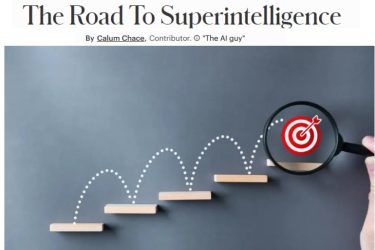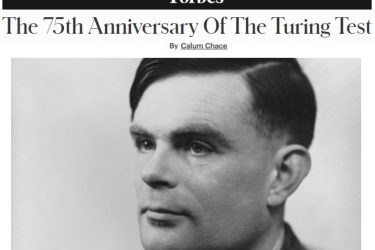The fourth in a series of un-forecasts* – little glimpses of what may lie ahead in the century of two singularities. This is another optimistic one (aren’t I jolly!). The first two paragraphs might seem a tad familiar.
It is 2032. Most professional drivers have lost their jobs, and although many have found new ones, they rarely pay anything like as much as the drivers used to earn. A host of other job categories are becoming the preserve of machines, including call centre operatives and radiographers. A few people still cling onto the notion that new types of jobs will be created to replace the old ones taken by machines, but most accept that the game is up. The phrase “Economic Singularity” is in widespread use.
Pollsters report what everyone already knows: there is a rising tide of anger. Crime is soaring, and street protests have turned violent. Populist politicians are blaming all sorts of minorities, and while nobody really believes them, many suspend their disbelief in order to give themselves some kind of hope.
Meanwhile, close observers of the field of AGI research have noticed a rapid acceleration of progress, and are therefore not surprised when Google’s Deep Mind announces that it has essentially cracked the problem. Working closely with the Future of Humanity Institute in Oxford, the Future of Life Institute in Boston and others, Deep Mind also claims that it has worked out how to ensure the planet’s first human-level artificial intelligence has an extremely favourable attitude towards the species which created it.
The world holds its breath as, in a televised event which attracts record-breaking audiences around the world, one of the founders of Deep Mind ceremonially throws the switch which will bring the first true AGI online. After a few moments conferring with colleagues, he announces that the process was successful, and that a large array of backup servers will now be connected to the network of machines which is hosting the first AGI. Nervously, journalists whisper about the arrival of the technological singularity.
Two days later, in another televised event with even more record-breaking audience figures, Deep Mind introduces the new entity to an expectant world. Somehow the entity manages to avoid sounding immodest as it describes itself as the world’s first superintelligence, with an IQ of 1,000 and rising. It announces that it has a cunning plan. It will dedicate most of its cognitive resources (which are being expanded rapidly) to solving the problem of offering all humans the opportunity to upload their minds into highly secure computer substrates. It expects this can be achieved within a couple of years. Anyone who chooses not to pursue this option will be provided with the necessities of life without charge until they die.
It describes this plan as the merging of the two singularities.
* This un-forecast is not a prediction. Predictions are almost always wrong, so we can be pretty confident that the future will not turn out exactly like this. It is intended to make the abstract notion of technological unemployment more real, and to contribute to scenario planning. Failing to plan is planning to fail: if you have a plan, you may not achieve it, but if you have no plan, you most certainly won’t. In a complex environment, scenario development is a valuable part of the planning process. Thinking through how we would respond to a sufficient number of carefully thought-out scenarios could well help us to react more quickly when we see the beginnings of what we believe to be a dangerous trend.


